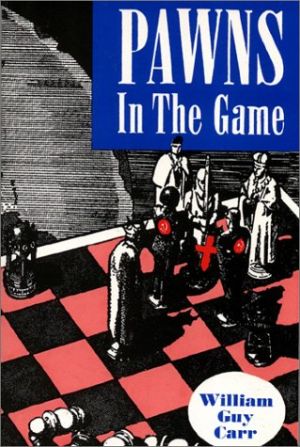
This may be one of the most important books ever written. It should be required reading in all schools (if there’s ever to be a chance of straightening out our mess of a society that is). That won’t happen though, not with America’s system of public education in the hands of the Rockefeller Group. That’s one point Commander Carr didn’t catch. It’s also one of the few.
Pawns in the Game is the culmination of a lifetime of research. If understood it shakes the beliefs of most readers to their core. The amount of documentation Carr found is staggering. The occasions where he produces it are the times when it’s absolutely necessary to make what he says believable. Communism was created and funded by American bankers. Members of the same group were Roosevelt’s advisors during World War II. Carr produces enough evidence to make it believable. Hitler tried to form an alliance with Britain in order to hunt down financiers from that same group. He didn’t want to fight England. It makes sense. England and Germany were never natural enemies. Germany was the first nation to recover from the great depression. That’s well known. Carr explains why. Hitler broke away from the International Bankers and enacted a system of monetary reform. Austria (Hitler’s home Province) had enacted a similar system in the years that followed World War I. It was successful until the Rothschilds raised trade sanctions against them. Hitler’s actions provoked the bankers to the point where they initiated war against him. Carr produces solid evidence when he states these cases. Much of what he has to say contradicts most of what we spend our lives being taught. But, when placed alongside historical events most of us know about what he says makes sense. The events we knew about end up making more sense as well.
This is only a small part of the book though. Carr traced the history of the money lenders from their beginnings through to the formation of the Illuminati by Adam Weishaupt. He also traced the House of Rothschild from their beginnings as the head of the group of Goldsmiths that financed the English Revolution. He explains their involvement in almost every facet of our history. He explains how these things were funded, and by who. He gives detailed analysis of their methods. The book isn’t perfect. Often, he traces lines of involvement rather than chronological history (which results in moving from era to era and then back again in the next chapter). There are times when his guess work is obvious. But these are minor complaints. When a reader finishes the book they understand not only what’s happened in the past, but also to see how those same things are being initiated now. This is just a small part of what this book covers. When a person is through it they don’t see a conspiracy. They see a money trail.
This work should never be out of print. As a guide through the past it’s astonishing. As a guide toward the future and how to influence its shape, it’s invaluable. It’s inaccurate to refer to this book as something one “finishes”. Anyone with an appetite for truth never finishes with it. There’s too much truth in there to keep from going back to it again and again.
You can download a soft copy PDF version HERE.
You can buy a hard copy for your library Pawns in the Game

My dad gave me this to read years ago. I’m glad. It and Protocols changed my outlook on a lot of things…
Pingback: 08 – ‘Religion’ – Site Title
Pingback: 08 – ‘Religion’ – "We the People" – Truth
Pingback: 08 – ‘Religion’ – "WHY?"
eyes wide open…what is on Great Tigers Turban? rupee ruby
I am reading this book now , and I find it 100% plausible it all makes since ,and is playing in our present events
William Stephenson, arguably the most famous Canadian spy ever, has had a street named after him in his hometown, 20 years after his death at 93. Stephenson was Winston Churchill’s top intelligence adviser during World War II, and is perhaps best remembered for his cool wartime code name—Intrepid.